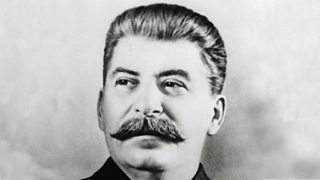How Does Napoleon Start To Undermine The Commandments Of Animalism
Characters
The characters in Animal farm can be split into three groups - the humans, the pigs, and the other farm animals. Each grouping represents a different element of the Russian Revolution in 1917.
Napoleon in Animal Farm
Napoleon is a threatening and 'fierce looking' Berkshire boar . He is one of the three pigs that take Erstwhile Major's ideas and plough them into 'Animalism' - a organization of thought that encourages the animals to rebel. He is not a gifted speaker but is known for getting his own way. He as well manages to become the support of the sheep, he encourages them to chant 'four legs good, two legs bad' during debates, preventing others making their points.
He takes two litters of puppies from their mothers and brings them upward himself. One time they have grown up he uses them to take control of the farm. Subsequently he has washed this, he and the other pigs start to break the Seven Commandments that the animals agreed to live past. He eventually becomes equally much of a tyrant as Mr Jones always was and exploits the other animals.
| How is Napoleon similar this? | Evidence from the text | Analysis | |
|---|---|---|---|
| Threatening | The mode Napoleon makes his bespeak during meetings carries threat. | He said very quietly that the windmill was nonsense and that he advised nobody to vote for it, and promptly sat downwards over again. | The sense of threat in the way Napoleon speaks 'very quietly', is sinister and menacing , there is a hint that he is planning something and he does not need to enhance his voice. |
| Hypocritical | Napoleon often contradicts himself or 'Animalism' in the messages he puts out through Sus scrofa. | Napoleon appear that there would be work on Sunday afternoons also. This work was strictly voluntary, merely any animal that absented himself from it would have his rations reduced by one-half. | Napoleon uses the discussion 'voluntary', yet the fact that it will result in reduced rations means that there is no choice for the animals - he is contradicting himself . |
| Tyrant | Napoleon abuses his ability to the point where he even kills some animals. | The dogs promptly tore their throats out, and in a terrible phonation Napoleon demanded whether whatsoever other fauna had annihilation to confess. | Napoleon has become a tyrant. He is capable of having his 'comrades' put to death to protect his position. When he 'demands' to know of more than confessions nosotros tin imagine the other animals cowering in fear. |
Social and historical context

Napoleon is based on the Soviet dictator, Joseph Stalin. Stalin was involved in the Russian Revolution of 1917 and came to rule Soviet Russia after the death of Vladimir Lenin in 1924.He ruled until his death in 1953. During his fourth dimension in power, the land was gripped by dearth and fear, millions of people starved to death and those who opposed him were imprisoned or killed.
The name besides evokes the French military leader, Napoleon Bonaparte (1776-1821), who seized power afterward the French Revolution, crowned himself Emperor and ruled France until 1815.
Analysing the evidence
Napoleon himself was not seen in public as often as once a fortnight. When he did announced, he was attended past non only his retinue of dogs but a black cockerel that marched in front of him and acted as a kind of trumpeter, letting out a loud 'cock-a-putter-doo' earlier Napoleon spoke. Even in the farmhouse, it was said, Napoleon inhabited split up apartments from the others.
- Question
-
Looking at this extract from the book, how does Orwell brand Napoleon seem more tyrannical as the novel goes on?
-
How to analyse the quote:
'Napoleon himself was not seen in public as often as once a fortnight. When he did appear, he was attended by not only his retinue of dogs but a black cockerel that marched in front of him and acted as a kind of trumpeter, letting out a loud 'cock-a-doodle-doo' earlier Napoleon spoke. Fifty-fifty in the farmhouse, it was said, Napoleon inhabited divide apartments from the others.'
- 'not seen in public' - this gives an e'er-increasing air of mystery and distances him from the other animals.
- 'retinue of dogs' - a further sense of fear every bit the animals are aware of what the dogs have washed at Napoleon's behest.
- 'black cockerel' - the blackness of the cockerel adds a sinister presence.
How to use this in an essay:
In the extract we run into how Napoleon was 'not seen in public' . This will assistance to create an atmosphere of mystery around him, and it makes him seem different to the other animals. The use of the 'retinue of dogs ' and the 'black cockerel' adds a sense of fear to that mystery - the animals accept seen the terrible acts that the dogs have committed on Napoleon'due south orders. The fact that the cockerel is 'black' gives it a sinister presence. All of these factors combine to make Napoleon seem more tyrannical.
Source: https://www.bbc.co.uk/bitesize/guides/zqxhn39/revision/3
Posted by: thompsonocces1967.blogspot.com

0 Response to "How Does Napoleon Start To Undermine The Commandments Of Animalism"
Post a Comment